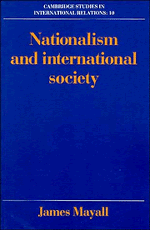Book contents
- Frontmatter
- Contents
- Acknowledgements
- Introduction
- 1 The search for the international system: the problem of theory
- 2 The society of states
- 3 Nationalism and the creation of states
- 4 Nationalism and the international order
- 5 Economic nationalism and the liberal world order
- 6 The new economic nationalism
- 7 Post-colonial nationalism
- 8 The third world and international society
- Conclusion
- Notes
- Index
5 - Economic nationalism and the liberal world order
Published online by Cambridge University Press: 05 July 2011
- Frontmatter
- Contents
- Acknowledgements
- Introduction
- 1 The search for the international system: the problem of theory
- 2 The society of states
- 3 Nationalism and the creation of states
- 4 Nationalism and the international order
- 5 Economic nationalism and the liberal world order
- 6 The new economic nationalism
- 7 Post-colonial nationalism
- 8 The third world and international society
- Conclusion
- Notes
- Index
Summary
Many contemporary explanations of nationalism seek its roots in the transition from agricultural to industrial society viewing it as an ideology which arises either in reaction to the pattern of uneven development under the capitalist system, or to meet the need for some social ‘cement’, such as was allegedly provided in traditional society by organised relgion and/or folk custom. I have avoided these arguments not because I consider the economic aspects of nationalism to be unimportant but because my purpose is to furnish an account of how nationalist theory and practice has been accommodated within the society of states, rather than to explain nationalism as a phenomenon.
It may be that historically the rise of nationalist doctrine followed closely on the break-up of traditional forms of society under the impact of industrialization. Undoubtedly, economic deprivation, real or imagined, has often ignited the flame of nationalist revolt. But the claims of nationalists are pressed in terms of national self determination and success or failure is measured in terms of their ability to capture the state. What is claimed is freedom and independence for its own sake and not merely as a means of securing a more equitable distribution of income. Within the milieu created by nationalist thought it seems mostly unlikely that Palestinians would be prepared to sink their identity in a prosperous diaspora spread throughout an economically dynamic Arab world.
- Type
- Chapter
- Information
- Nationalism and International Society , pp. 70 - 87Publisher: Cambridge University PressPrint publication year: 1990

